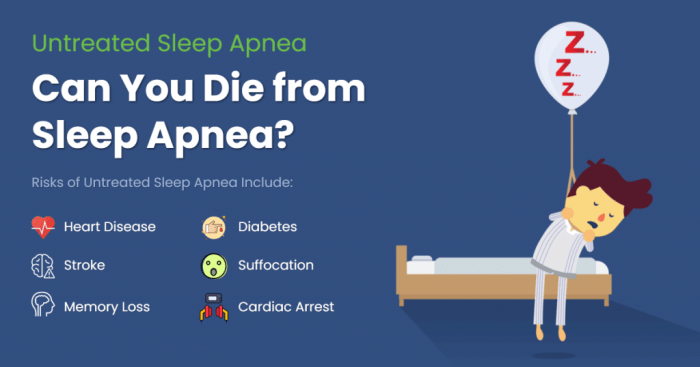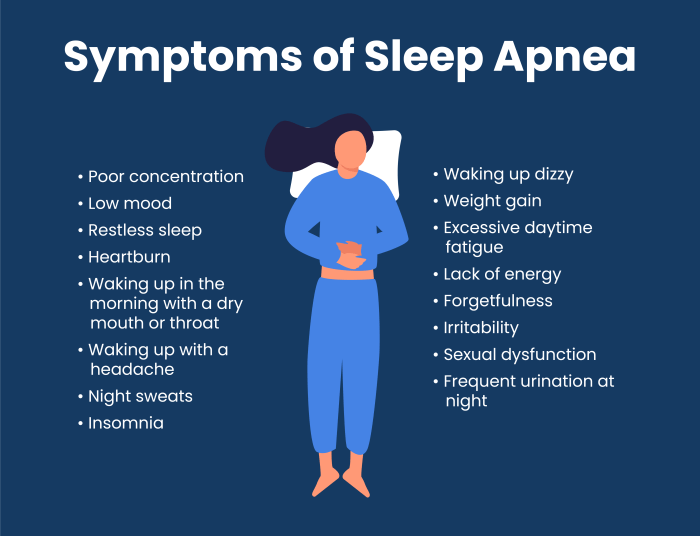Which of the following statements regarding sleep apnea is false? This question delves into the complexities of a prevalent sleep disorder, unraveling misconceptions and shedding light on its true nature. Join us as we embark on an exploration of sleep apnea, separating fact from fiction and empowering you with knowledge to optimize your sleep and overall well-being.
Sleep apnea, characterized by recurrent pauses in breathing during sleep, can have significant implications for physical and mental health. Understanding the condition and its various facets is paramount to effective management and improved quality of life.
Understanding Sleep Apnea

Sleep apnea is a serious sleep disorder that affects millions of people worldwide. It occurs when breathing repeatedly stops and starts during sleep, leading to periods of oxygen deprivation and disrupted sleep patterns.
Symptoms of Sleep Apnea
Common symptoms of sleep apnea include:
- Loud snoring
- Gasping or choking sensations during sleep
- Excessive daytime sleepiness (EDS)
- Morning headaches
- Difficulty concentrating
- Irritability or mood changes
Types of Sleep Apnea
There are three main types of sleep apnea:
-
-*Obstructive sleep apnea (OSA)
The most common type, caused by a blockage in the upper airway.
-*Central sleep apnea (CSA)
Caused by a problem with the brain’s control of breathing.
-*Mixed sleep apnea (MSA)
A combination of OSA and CSA.
Risk Factors for Sleep Apnea
Risk factors for sleep apnea include:
- Obesity
- Large neck circumference
- Family history of sleep apnea
- Nasal congestion
- Smoking
- Alcohol consumption
Statement Analysis: Falsehood Identification

False Statement:Sleep apnea is not a serious health condition. Explanation:This statement is incorrect. Sleep apnea is a serious sleep disorder that can lead to several health complications, including cardiovascular disease, stroke, and type 2 diabetes. Untreated sleep apnea can also increase the risk of accidents and death.
Correct Information:Sleep apnea is a potentially life-threatening condition that requires prompt diagnosis and treatment.
Impact of Sleep Apnea on Health

Untreated sleep apnea can have significant health consequences, including:
Cardiovascular Disease
Sleep apnea is strongly associated with an increased risk of cardiovascular disease, including heart attack, stroke, and heart failure.
Stroke
People with sleep apnea have a higher risk of stroke, particularly those with OSA. The oxygen deprivation during sleep can damage the arteries and increase the risk of blood clots.
Other Chronic Conditions, Which of the following statements regarding sleep apnea is false
Sleep apnea is also linked to an increased risk of other chronic conditions, such as:
- Type 2 diabetes
- Obesity
- Depression
- Cognitive impairment
Treatment Options for Sleep Apnea

There are several treatment options available for sleep apnea, including:
Continuous Positive Airway Pressure (CPAP) Therapy
CPAP therapy is the most common treatment for OSA. It involves wearing a mask over the nose or mouth during sleep, which delivers pressurized air to keep the airway open.
Oral Appliances
Oral appliances are devices that fit in the mouth and help to keep the airway open. They are often used for mild to moderate OSA.
Surgery
Surgery may be an option for people with severe OSA who do not respond to other treatments. Surgery aims to remove or reposition tissues that are blocking the airway.
Lifestyle Modifications
Lifestyle modifications can also help manage sleep apnea symptoms, such as:
- Losing weight
- Avoiding alcohol before bed
- Quitting smoking
- Getting regular exercise
Q&A: Which Of The Following Statements Regarding Sleep Apnea Is False
Is sleep apnea a serious condition?
Yes, untreated sleep apnea can lead to severe health complications, including cardiovascular disease, stroke, and cognitive impairment.
Can lifestyle changes help manage sleep apnea?
Yes, losing weight, avoiding alcohol before bed, and establishing a regular sleep schedule can improve sleep apnea symptoms.